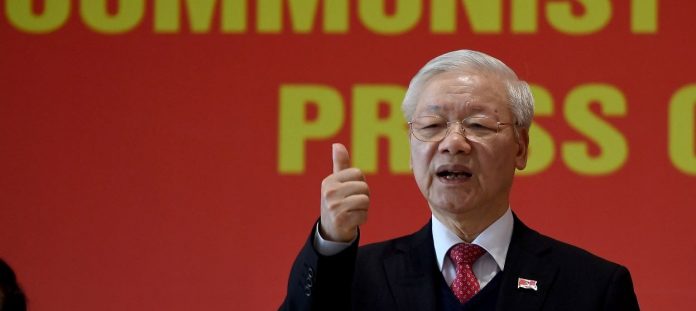Hanoi has been promoting the concept of ‘bamboo diplomacy’ to define its foreign policy of independence and refusal to take sides in international disputes.
The term ‘bamboo diplomacy’ has recently gained prominence in Vietnam’s foreign policy discourse. A previously unfamiliar concept has been used to cast new light on Vietnam’s diplomatic gains since the 1986 Doi Moi reform and to discuss the lessons that small states should learn from Russia’s invasion of Ukraine. In a polarised international environment, ‘bamboo diplomacy’ describes Vietnam’s experience in balancing competing geopolitical interests in the past three decades.
The image of the bamboo is deeply embedded in Asian culture and diplomacy. For instance, Thailand’s foreign policy has long been characterised as akin to bamboo “bending with the wind”. Like Thailand, Vietnam’s bamboo diplomacy embodies flexibility and pragmatism, with independence and national interests as its basis.
However, the two countries differ in how they stay flexible and pragmatic. For Thailand, this historically meant siding with the prevailing great power to ensure its survival. For example, in the face of Western sanctions following the 2014 coup d’état, Thailand distanced itself from its longstanding ally, the United States, and courted Beijing for economic gain. In contrast, for Vietnam, bamboo diplomacy has meant striving to remain independent and equidistant vis-à-vis all major powers, maximising gains while hedging against strategic uncertainties.
Vietnam’s diplomatic achievements in the past decades have provided sufficient empirical basis for this conceptualisation of a Vietnamese school of diplomacy. With Doi Moi, Vietnam shifted from an ideology-driven foreign policy to one that is based primarily on national interests and the principles of independence, self-reliance, multilateralism, and diversification. This has allowed the country to build a diverse network of comprehensive and strategic partnerships to maintain a high level of socioeconomic development and to gain prestige regionally and internationally.
‘Bamboo diplomacy’ may serve to project a ‘Vietnamese way’ that is neither pro-U.S. nor pro-China
The current promotion of bamboo diplomacy denotes Vietnam’s confidence in its conduct of foreign affairs. As Nguyen Phu Trong, the General Secretary of the Vietnam Communist Party, reflected, “Like bamboos with strong roots, solid stems and flexible branches, Vietnamese diplomacy is soft and clever but still persistent and resolute; flexible, creative but consistent, valiant and resilient against all challenges and difficulties for national independence and people’s happiness…resolute, persistent and patient in safeguarding the national interests.“
The bamboo analogy appropriately encapsulates how Vietnam has manoeuvred its position amidst intensifying great power competitions, which loom large in the country’s security outlook. Beijing’s increasing assertiveness in the South China Sea has prompted Hanoi to enhance its ties with the West in a flexible manner. Yet, Vietnam remains resolute in upholding the ‘four Nos’ in its 2019 Defence White Paper (that is, no military alliances, no taking sides, no permission for Vietnam to be used as a military base by foreign powers, and no use of force in international relations). Hanoi also wishes to preserve cooperation with its northern neighbour. ‘Bamboo diplomacy’ may serve to project a ‘Vietnamese way’ that is neither pro-U.S. nor pro-China.
The polarising Russia-Ukraine war has only intensified Vietnam’s attachment to bamboo diplomacy. Domestically, the Vietnamese public is divided about the war, given the country’s longstanding affinity with the former Soviet Union. These internal disagreements and external criticism of Vietnam’s stance on the conflict may prove more divisive in future. While stressing the need for all parties to uphold international law and the UN Charter, Vietnam refuses to side with the West in condemning Russia.
Trong’s use of the bamboo diplomacy concept can be traced back to the 29th Diplomatic Conference in 2016, where he said that Vietnam had “built an outstanding and unique school of foreign relations and diplomacy of the Ho Chi Minh era, bearing the character of the ‘Vietnamese bamboo’”. At Vietnam’s first national conference on foreign affairs in 2021, Trong reaffirmed and elaborated on this idea.
As he is the most senior politician in Vietnam, Trong’s speeches are heeded because of his popularity and prestige. He masterminded the years-long, high-profile anti-corruption campaign, the ‘burning furnace’ that has been making headlines in Vietnam and gaining popular support in recent years.
Hanoi has prioritised international integration since Doi Moi and hopes to redefine its national cultural identity and diplomatic identity, with ‘bamboo diplomacy’ and Ho Chi Minh Thought placed front and centre. The writings of Ho Chi Minh are mined for diplomatic insights and his emphases on harmonious relations, humanitarianism, flexibility, self-reliance, and national independence chime with bamboo diplomacy.
We can expect the continued use and concretisation of the concept through Hanoi’s future policies and academic studies. Contemporary academic fervour in developing a Ho Chi Minh school of diplomacy suggests that bamboo diplomacy could precede a new ‘Doi Moi’ or refreshed Vietnamese identity that is decidedly more flexible than its ideologically rigid predecessor. BY PHAN XUAN DUNG|TO MINH SON/ FULCRUM




